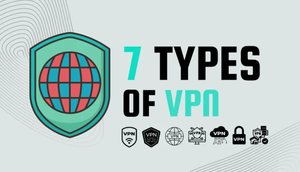Blog Information
- Posted By : rayden alice
- Posted On : Jul 24, 2024
- Views : 264
- Category : General
- Description : Explore the types of VPNs: Personal, Mobile, Remote Access, SSL, Site-to-Site, Cloud, and Double VPNs. Learn when to use each one effectively.
Overview
Explore the types of VPN types: Personal, Mobile, Remote Access, SSL, Site-to-Site, Cloud, and Double VPNs. Learn when to use each one effectively.
In today's digital age, protecting online privacy and securing internet connections are more important than ever. Virtual Private Networks (VPNs) are essential tools that provide security and privacy by encrypting data and masking the user's IP address. There are various types of VPNs, each designed for specific needs and situations. In this comprehensive guide, we will explore the different types of VPNs, including Personal, Mobile, Remote Access, SSL, Site-to-Site, Cloud, and Double VPNs, and discuss when to use each one effectively.
Personal VPNs
Overview of Personal VPNs
Personal VPNs are designed for individual users who want to secure their internet connections and protect their online privacy. These VPNs are typically easy to set up and use, making them ideal for non-technical users. They provide encryption for all internet traffic, ensuring that data is secure from hackers and other malicious entities.
When to Use Personal VPNs
- Public Wi-Fi Protection: Personal VPNs are perfect for securing connections on public Wi-Fi networks, such as in cafes or airports, where security is often weak.
- Accessing Geo-Restricted Content: These VPNs allow users to bypass geographic restrictions and access content that is otherwise unavailable in their region.
- Enhancing Privacy: Personal VPNs mask the user's IP address, making it difficult for websites and advertisers to track online activities.
Mobile VPNs
Overview of Mobile VPNs
Mobile VPNs are specifically designed for use on smartphones and tablets. They provide seamless security and connectivity, even when the user switches between different networks or moves in and out of coverage areas. Mobile VPNs ensure that the connection remains secure and uninterrupted.
When to Use Mobile VPNs
- Frequent Travelers: Mobile VPNs are ideal for individuals who travel frequently and need secure internet access on the go.
- Network Switching: They are beneficial for users who often switch between Wi-Fi and cellular networks, as they maintain a consistent and secure connection.
- Remote Work: Mobile VPNs are essential for remote workers who need to access sensitive company information from their mobile devices.
Remote Access VPNs
Overview of Remote Access VPNs
Remote Access VPNs are commonly used by businesses to provide secure access to their internal networks for remote employees. These VPNs enable employees to connect to the company’s network from anywhere, ensuring that data transmitted between the employee and the company is encrypted and secure.
When to Use Remote Access VPNs
- Telecommuting: Remote Access VPNs are crucial for employees working from home or other remote locations, allowing them to securely access company resources.
- Secure Data Transmission: They are used to protect sensitive business data transmitted over the internet.
- Access to Internal Applications: Remote Access VPNs enable employees to access internal applications and files as if they were physically present in the office.
SSL VPNs
Overview of SSL VPNs
SSL VPNs (Secure Sockets Layer VPNs) use the SSL protocol to create a secure and encrypted connection between the user’s device and the VPN server. These VPNs can be accessed through a web browser, eliminating the need for specialized client software. SSL VPNs are known for their ease of use and high security.
When to Use SSL VPNs
- Browser-Based Access: SSL VPNs are ideal for users who need to access the VPN through a web browser without installing additional software.
- Temporary Access: They are suitable for providing temporary access to external users, such as contractors or partners.
- Sensitive Transactions: SSL VPNs are commonly used for secure transactions, such as online banking or e-commerce.
Site-to-Site VPNs
Overview of Site-to-Site VPNs
Site-to-Site VPNs connect entire networks to each other, such as connecting the network of a branch office to the main office. These VPNs are often used by businesses to securely connect multiple locations over the internet. Site-to-Site VPNs can be either intranet-based (connecting different offices of the same company) or extranet-based (connecting different companies).
When to Use Site-to-Site VPNs
- Branch Office Connectivity: Site-to-Site VPNs are essential for connecting branch offices to the main office securely.
- Business Partnerships: They are used to securely connect the networks of partner businesses, allowing for seamless collaboration.
- Unified Network: Site-to-Site VPNs create a unified network experience for employees, regardless of their physical location.
Cloud VPNs
Overview of Cloud VPNs
Cloud VPNs provide secure access to cloud-based resources and services. These VPNs are integrated with cloud providers, allowing businesses to extend their on-premises networks to the cloud securely. Cloud VPNs are scalable and flexible, making them suitable for modern cloud-based infrastructures.
